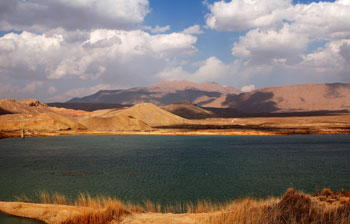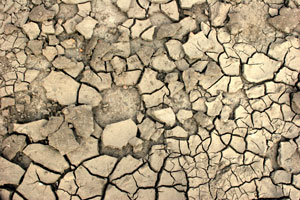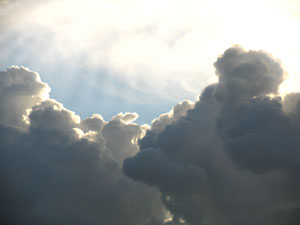| |
And it came
to pass after a while that the brook dried up,
because there had been no rain in the land.
(1 Kings 17:7 KJV) |
|
For several long months
Elijah lived in enforced seclusion. Blessed though he
would have been by the Lord’s presence, it must have
been a time of great tension. Not only did he have to
wait day after day for the ravens to bring him food, he
would have been conscious, too, that Ahab the Vengeful
was scouring the country for him. As if these pressures
were not enough, Elijah now faced a still more imminent
danger: his supply of water was beginning to dry up!
| Whichever way you look at it, Elijah’s situation was
critical. It seems inconceivable that the Lord should
appear to abandon Elijah at the very moment when he
needed Him most, but facts must be faced. The Lord had
said that Elijah would drink from the brook, but He had
not promised to send any rain, and the Cherith brook
really was drying up. Neither had He shown him what He
was going to do to provide for him. As the full weight
of his predicament settled on him, any hope of being of
use again to man or nation must have seemed like a
distant mirage. All too acutely he would have felt the
poverty of his food, the harshness of his environment
and the monotony of his days. |

Morguefile |
Everything had been
bearable so long as the brook flowed – he might even
have counted it a privilege to make do with so little –
but who can live without water?
As Elijah watched the brook shrinking, it would have
been easy to have indulged in bitter thoughts towards
God. Like Isaiah he might have shouted out: ‘Truly, You
are a God who hides Himself!’(1) Elijah does not waste
time and energy blaming God for his situation, and
neither should we when we find ourselves faced with
equally incomprehensible and life or
ministry-threatening situations.
All of us approach life with certain basic
assumptions. In many ways, the further we go
with the Lord the higher these expectations will
be. Buoyed up by past deliverances, triumphant
faith reaches out to believe for more than is
humanly possible. But what happens when we step
out in obedience, only to find circumstances
appearing to contradict all that we believe God
has promised us? |

Morguefile |
Since many are finding themselves
confronted by just such a sequence in their lives at
this time, I would like to share a spiritual pattern
with you which we have experienced on many occasions,
and which may, perhaps, speak to your own condition. We
find ourselves confronted with a serious difficulty,
much as Elijah faced a shortage of water. We are
thrilled if God speaks to us about it. What He says,
however, may still leave us feeling bewildered, because
we can see no way by which God’s word can be fulfilled.
Or He seems to say nothing at all, and we are left to
work out what to do. These are the most painful of all,
especially if we sense that other people look askance at
our apparent failure.
This is a time for perseverance, for doing what the Lord
gives us to do from one day to the next, and for not
giving in. God is closer than we think. Sooner of later,
further revelation will be granted, or a fresh set of
circumstances unfold, and all that has been promised or
that is truly necessary will come into view. The
important thing is to be ready to act on it when it
does.
There may be other occasions when we will need to eat
humble pie and admit that we had been mistaken in
supposing that it was the Lord who had led us in some
particular direction. Sadly, some are too proud, and
some too stubborn, to retrace their steps at this point.
|

Morguefile |
Hanging on grimly to what
they mistakenly believe to have been a word from the
Lord, they bulldoze forward, ensnaring others in their
lopsided way of thinking.
| If I
may be allowed to alliterate for a moment, we
might summarise this process like this:
|
| |
first we have
some extreme Difficulty (which may incline us to
feel Despondent).
If Discernment comes, it brings us great
Delight.
Once the initial Delirium has worn off, however,
we are still left with such a Dilemma that we
risk entering a further period of Darkness.
Provided we do not open the gate to Doubt or
Delusion, however, we will live to experience
God’s Deliverance to our great Delectation |
|
Avoiding Panic
Situations
Generations of viewers of Dad’s Army have
enjoyed Corporal Jones’ panic stricken call to his
soldiers ‘Don’t panic! Don’t panic!’ As Elijah looked
around the drearily familiar terrain that bordered his
dried-up wadi, he must have been sorely tempted to do
just that and to head off and chance his arm somewhere
else. Thirst can make people do the most desperate
things, and since waiting itself can be so challenging,
doing almost anything would have felt better than doing
nothing.
In far less testing circumstances than those which
Elijah faced, have we not rushed to seek solutions to
our predicaments with all the poise of a distraught
chicken trying to cross a busy man road? If we have
known the temptation to come home early from a retreat,
or to abandon a project too soon, we can readily imagine
that Elijah must have experienced an almost overwhelming
longing to head somewhere else and take his chance with
the king’s hostility.
| Someone pointed out that ‘A diamond is a lump of coal
that has been transformed under pressure into something
exquisitely beautiful.’ If ever there was a rough
diamond it was Elijah, and he knew that the Lord had led
him to the brook Cherith. He dared not desert his post,
therefore, without a fresh commission. Resolutely
refusing to run away, Elijah waited for the Lord to show
him what to do next.
This is faith on
the line. Unless God intervened, Elijah was
going to be just one more victim of the
devastating drought. If the Lord was closing
down this means of support, then He would surely
open up another. Would the Lord once again cause
water to pour from a rock as He had done for
Moses? Not on this occasion. |

Morguefile |
It is a great mistake to
assume God will always do the same sort of thing twice. God has different plans for each situation
that we face. We can never afford to rest on yesterday’s
deliverance or rely on yesterday’s guidance. It is
entirely consistent with the way the Lord works that He
allowed Elijah to watch the water-level shrinking from
one day to the next before telling him what He was going
to do about the situation.
The grace of God shields us from many difficulties, but
faith is always put to the test sooner or later. Before
the Lord does something special He allows us to see the
extent of the problem. Before He does something
magnificent, however, He allows it to appear completely
impossible! Did not Moses and the Israelites have to
watch the Egyptian army drawing ever closer in hot
pursuit before the Lord disclosed His extraordinary plan
to bring His people safely through the Red Sea?
During those times when the ‘stream’ of our life (our
source of supply) is drying up, it is not surprising if
we are more conscious of the absence of God than of His
presence. The Lord often ‘hides’ His purpose from us
during these periods for the simple reason that if we
knew what was going to happen in advance, we would be
rest complacently on the outcome rather than remain in
an attitude of humble dependency and a spirit of fervent
prayer.
| |
‘When I called,
you answered me,’ the psalmist declares. ‘You
made me bold and stouthearted. Though I walk in
the midst of trouble, You preserve my life; You
stretch out your hand against the anger of my
foes, with Your right hand you save me. The Lord
will fufill His purpose for me. (Psalm
138:3,7-8)
|
|
|
In His great faithfulness
the Lord will yet fulfil His purposes for our lives. The
very dryness can serve to sharpen our longing and to
purify our prayer. Has He ever let His loved ones down?
Time and again we suffer needless worry because we
cannot see how He is going to handle some dilemma that
is beyond our control. The Lord is not anxious: He knows
what He is doing, and He wants our hearts to be made
stronger, as opposed to harder, through the things which
happen to us. |
 |
|
Morguefile |
But He will never allow Himself to be limited by our
expectations. The sentence of drought had been decreed,
and if Elijah had fallen into the trap of believing that
this particular stream would be spared, then he would
have been deceiving himself. Do not so many of our
mistakes and deceptions stem from adding our own
interpretation to what God has said? Deception always
makes us less well equipped to handle reality.
|
The Sinai Blues
|
As the brook dried up, Elijah was being reminded in
the most direct way possible that he could not afford to
look to any earthly support for his ultimate security.
We are pilgrims on a journey, and although we must
devote proper time and effort to our earthly
responsibilities, we must always remember where our real
roots lie. ‘For here we have no enduring city, but
are looking for the city that is to come.’(3)
If the Lord allows us, like Elijah, to watch the stream
of our earthly provision drying up before He shows us
what He is going to do about it, then this is, in one
sense, only to highlight the contrast between our
helplessness and His all-sufficiency. |

Morguefile |
He will never allow us to
be tested beyond our ability to endure. He who sent us
out will also provide us with all that we need to make
it to the end of our journey, for His commissions
contain His hidden provision.
I cannot speak for you, but I am only too aware of my
propensity to fall into ‘moan-mode’ whenever the going
gets sufficiently tough, or when I am feeling tired or
anxious. We may not be responsible for the things that
happen to us, but we assuredly are for our response. One
of the most unhelpful things we can do during these
times of uncertainty is to succumb to the sin which
plagued the children of Israel during their long years
in the wilderness – the grumbling spirit which I will
call ‘The Sinai Blues’.

Morguefile |
Humanly speaking, Elijah had good reason to be afraid.
This man of the mountains knew, far better than us, that
ravens are members of the crow family. They are
scavengers of food not distributors of it! Just imagine
how unhappy Elijah would have been if he had spent his
days worrying whether the ravens would remember to come
the next day, instead of thanking God that He was
thinking of him. Where was their seemingly inexhaustible
secret store of food coming from anyway? And what would
happen (in our terminology) if some trigger-happy farmer
fetched his gun and made himself a raven pie? And, if
any of you have felt concerned at being out of phone or
mobile range, just what was going on back home while he
was stuck in the middle of nowhere?
If you are anything like me, you probably waste a great
deal of mental energy worrying about things the Lord
already has in hand. It is rather like driving with one
foot on the brake! We cannot change the past, but we can
easily ruin a perfectly good present by worrying about
the future.
|
I always think it risks
sounding harsh to say that worry is a sin, given how
inclined most of us are to it so let’s just put it the
other way round: it is not a sin not to worry!
Convicted?
In the Hebrew text of the beautiful verse, ‘You will
keep in perfect peace him whose mind is steadfast,’(4)
the word ‘peace’ is repeated twice. ‘Perfect peace’
translates this phase happily, and encourages us to
focus on matters that will strengthen our mind.
In the Revised Version, the word ‘mind’ is
translated ‘imagination’. This is a useful
reminder for those of us who know how dreadful
it can be to let our imagination dwell on things
which weaken our will. What a joy it is
to discover that the focus of our anxiety turns out to
have been an imaginary fear or problem, like the two
Marys, who made their way to the tomb worrying how they
were going to roll the stone away, we will often find
the Lord has already rolled our ‘stones’ aside for us.
God be praised, by far the greater number of our fears
are groundless. |

Morguefile |
Psychologists reckon that 80% of our fears have no
substance in reality – but it is a sad indictment that
we, who are the only people on Earth who can really
afford to be joyful, so rarely are. It is the inordinate
passions which weigh us down: avarice, which can never
have enough, and ambition that knows no limit. These are
the emotions that inflame and bewitch the heart.
The Scattering of our Fears
Christians who have learnt the secret of praising
God during times of testing and distress will be far
less prone to those faith-crippling bouts of the ‘But
what if’ mentality. Praise and worship counteract our
tendency to grumble and are the best and fastest way to
remind ourselves that all things do indeed work
together for the good of those who love the Lord.(5)
By praise and faith we can overcome every giant which
stands in our way, and every thought. Jesus taught His
disciples so much about the nature and the power of
faith because He wants to see us respond to our problems
with the same faith and trust with which He Himself met
difficulties. Faith and fear are opposites. It is
impossible to praise God and succumb to negative
thoughts at one and the same time. Frank Boreham
illustrates this principle with a telling parable. He
suggests that, like the virgins, there are two kinds of
bird: the wise and the foolish. The foolish birds are
deterred by the scarecrow – but the wise ones realised
that the presence of a scarecrow was pointing to there
being particularly juicy pickings to be had!
| Do
not be too upset, therefore, when circumstances
appear almost overwhelmingly difficult. Say
rather, |
| |
‘I am here by
His will in this affliction of sickness, in this
painful time when friends forsake me, and when
the forces of the world and of darkness are
pressing in on me. He is here with me, and since
He is always more faithful to me than I deserve,
He will deliver me from this dilemma too.’
|
|
‘All things are
possible to him who believes,’ Brother Lawrence
wrote, ‘they are less difficult to him who hopes;
they are still easier to him who loves; they are even
easier to him who practices all three virtues.’(6)
The Lord who was with Elijah is also with us, even if at
times it may feel as though everything around us is
shrinking rather than expanding – and He is trusting us
to keep going. Although we may feel as though all we had
hoped and longed for is further away than ever from us,
God knows both what He must do, and when He must do it
in order to lead us on. He will not fail to send us His
‘ravens’ when we have set out on a project at His
bidding.
For Reflection
You may well be aware of a number of such ‘shrinking
brook’ situations. It may be a business or an
organisation that is struggling to make ends meet, or a
friendship that is under strain. Commit them now to the
Lord and ask Him to pour out His mercy on them, and to
keep the people involved free from the Sinai blues!
|
Selah |
| |
Lord, I praise
You that nothing is impossible for those who
have faith in You, but I confess that my faith
has sometimes faltered as I have watched the
waters shrinking from day to day.
Forgive me
that I have looked more at the water level than
I have at You. Here and now I resolve that the
very next time a situation occurs which looks as
though Your purposes are going to be defeated,
that I will trust You to work the situation out
to bring You glory. In Jesus’ name. Amen. 7 |
|
|
| |
 |
|
|
|

